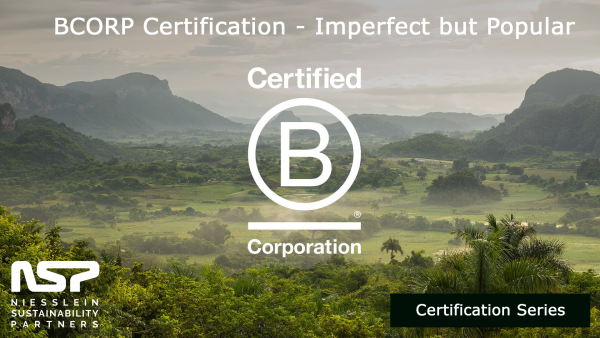BCorp: A Popular Sustainability Certification
The increasing imperative for businesses to operate responsibly in the face of environmental degradation, social inequality, and stakeholder pressure has prompted the emergence of numerous sustainability certification schemes. Among the most prominent is the B Corporation (B Corp) certification, administered by the non-profit organisation B Lab. La...
The increasing imperative for businesses to operate responsibly in the face of environmental degradation, social inequality, and stakeholder pressure has prompted the emergence of numerous sustainability certification schemes. Among the most prominent is the B Corporation (B Corp) certification, administered by the non-profit organisation B Lab. Launched in 2006, the certification seeks to redefine business success by encouraging organisations to meet high standards of verified social and environmental performance, public transparency, and legal accountability.
As of 2025, over 9,500 companies across more than 100 countries and 160 industries have achieved B Corp certification. This exponential growth reflects a growing global demand for business models that balance purpose with profit. However, the certification is not without its critiques. This article offers a critical overview of the B Corp framework, exploring its evolution, governance structure, benefits, and limitations.
The Evolution and Popularity of B Corp Certification
Since its inception, B Corp certification has experienced substantial global expansion. Between 2015 and 2020, the number of B Corps in North America grew by an estimated 23% annually. Europe, meanwhile, saw a 63% increase in certified firms in 2022 alone, while Asia witnessed a staggering 300% increase between 2016 and 2020. Such growth has been fuelled by increasing investor interest in ESG (environmental, social, and governance) metrics, as well as by consumer demand for more ethical and transparent business practices.
This growth has also been propelled by the appeal of a recognised third-party certification that distinguishes companies committed to social and environmental good. For many firms, B Corp status serves not only as a marker of responsibility but also as a means to gain competitive advantage and enhance organisational culture.
Governance Strengths and Legal Accountability
A distinguishing feature of the B Corp model is its insistence on embedding stakeholder governance within an organisation’s legal framework. To qualify for certification, companies must amend their governing documents to prioritise the interests of all stakeholders — including employees, customers, communities, and the environment — rather than solely maximising shareholder value.
This legally binding commitment differentiates B Corps from companies that merely adopt sustainability initiatives on a voluntary basis. It promotes long-term thinking, risk management, and organisational resilience, and aligns corporate purpose with broader societal needs. This shift towards stakeholder capitalism is increasingly seen as a necessary adaptation in a world of compounding environmental and social risks.
Benefits of B Corp Certification
B Corp certification confers several strategic and operational advantages:
1. Enhanced Credibility and Brand Differentiation
Certified B Corps benefit from increased trust and brand recognition. The certification is independently verified, thereby offering reassurance to consumers, employees, and investors that a company’s ethical claims are substantiated.
2. Talent Attraction and Employee Engagement
Research consistently shows that mission-led organisations attract individuals seeking purposeful work. B Corps often report higher employee satisfaction and retention, attributable to inclusive governance structures, ethical labour practices, and a values-driven culture.
3. Financial and Operational Performance
Evidence suggests that B Corps outperform peers in terms of revenue growth and business resilience. For example, between 2023 and 2024, UK-based small and medium-sized B Corps reported an average turnover growth of 23.2%, significantly outpacing the national average of 16.8%.
4. Network and Collaboration Opportunities
Membership within the global B Corp community opens access to collaborative opportunities, resources, and partnerships with like-minded organisations, thereby fostering innovation and shared impact. Limitations and Critical Perspectives
Despite its merits, the B Corp certification is not immune to critique:
1. Risk of Greenwashing
One of the most pressing concerns is that certification may be used as a marketing tool by companies not genuinely committed to sustainability. The assessment process allows companies to offset weaknesses in one domain with strengths in another, potentially masking problematic practices.
2. Inclusion of Large Corporations
The certification of major multinationals such as Nespresso and Danone has raised questions about the robustness of the standards. Critics argue that the complexities of large corporate structures and supply chains are not always adequately addressed by the current framework.
3. Resource and Time Intensiveness
The process of becoming a B Corp is comprehensive, involving detailed data collection, impact assessment, and legal restructuring. While this rigour ensures credibility, it also poses barriers for small enterprises with limited resources.
4. Inconsistent Public Awareness
Although growing, consumer recognition of the B Corp label remains inconsistent in many markets. This limits the reputational benefits for some firms and may deter investment in certification.
The Future of B Corp: Reforms and Rigor
Recognising some of the above concerns, B Lab has recently introduced revisions aimed at strengthening the certification’s impact. From 2024 onwards, companies are required to meet minimum standards across key sustainability topics, including climate action, human rights, and diversity, equity, and inclusion.
These changes are designed to ensure that companies cannot rely on exceptional performance in one area to compensate for deficiencies in another. Such reforms aim to preserve the integrity of the B Corp standard while increasing its relevance in an era of escalating scrutiny of corporate ESG claims.
B Corp certification represents a significant innovation in the field of corporate sustainability, offering a structured and credible means for companies to demonstrate commitment to stakeholder-oriented business practices. While it is not without its limitations, the certification’s rapid global uptake and ongoing evolution indicate that it is increasingly seen as a meaningful tool for companies seeking to integrate social and environmental purpose into their core strategy.
For organisations genuinely interested in using business as a force for good, B Corp certification offers both a rigorous assessment framework and a platform for accountability and continuous improvement.
#Sustainability
Read more
As of 2025, over 9,500 companies across more than 100 countries and 160 industries have achieved B Corp certification. This exponential growth reflects a growing global demand for business models that balance purpose with profit. However, the certification is not without its critiques. This article offers a critical overview of the B Corp framework, exploring its evolution, governance structure, benefits, and limitations.
The Evolution and Popularity of B Corp Certification
Since its inception, B Corp certification has experienced substantial global expansion. Between 2015 and 2020, the number of B Corps in North America grew by an estimated 23% annually. Europe, meanwhile, saw a 63% increase in certified firms in 2022 alone, while Asia witnessed a staggering 300% increase between 2016 and 2020. Such growth has been fuelled by increasing investor interest in ESG (environmental, social, and governance) metrics, as well as by consumer demand for more ethical and transparent business practices.
This growth has also been propelled by the appeal of a recognised third-party certification that distinguishes companies committed to social and environmental good. For many firms, B Corp status serves not only as a marker of responsibility but also as a means to gain competitive advantage and enhance organisational culture.
Governance Strengths and Legal Accountability
A distinguishing feature of the B Corp model is its insistence on embedding stakeholder governance within an organisation’s legal framework. To qualify for certification, companies must amend their governing documents to prioritise the interests of all stakeholders — including employees, customers, communities, and the environment — rather than solely maximising shareholder value.
This legally binding commitment differentiates B Corps from companies that merely adopt sustainability initiatives on a voluntary basis. It promotes long-term thinking, risk management, and organisational resilience, and aligns corporate purpose with broader societal needs. This shift towards stakeholder capitalism is increasingly seen as a necessary adaptation in a world of compounding environmental and social risks.
Benefits of B Corp Certification
B Corp certification confers several strategic and operational advantages:
1. Enhanced Credibility and Brand Differentiation
Certified B Corps benefit from increased trust and brand recognition. The certification is independently verified, thereby offering reassurance to consumers, employees, and investors that a company’s ethical claims are substantiated.
2. Talent Attraction and Employee Engagement
Research consistently shows that mission-led organisations attract individuals seeking purposeful work. B Corps often report higher employee satisfaction and retention, attributable to inclusive governance structures, ethical labour practices, and a values-driven culture.
3. Financial and Operational Performance
Evidence suggests that B Corps outperform peers in terms of revenue growth and business resilience. For example, between 2023 and 2024, UK-based small and medium-sized B Corps reported an average turnover growth of 23.2%, significantly outpacing the national average of 16.8%.
4. Network and Collaboration Opportunities
Membership within the global B Corp community opens access to collaborative opportunities, resources, and partnerships with like-minded organisations, thereby fostering innovation and shared impact. Limitations and Critical Perspectives
Despite its merits, the B Corp certification is not immune to critique:
1. Risk of Greenwashing
One of the most pressing concerns is that certification may be used as a marketing tool by companies not genuinely committed to sustainability. The assessment process allows companies to offset weaknesses in one domain with strengths in another, potentially masking problematic practices.
2. Inclusion of Large Corporations
The certification of major multinationals such as Nespresso and Danone has raised questions about the robustness of the standards. Critics argue that the complexities of large corporate structures and supply chains are not always adequately addressed by the current framework.
3. Resource and Time Intensiveness
The process of becoming a B Corp is comprehensive, involving detailed data collection, impact assessment, and legal restructuring. While this rigour ensures credibility, it also poses barriers for small enterprises with limited resources.
4. Inconsistent Public Awareness
Although growing, consumer recognition of the B Corp label remains inconsistent in many markets. This limits the reputational benefits for some firms and may deter investment in certification.
The Future of B Corp: Reforms and Rigor
Recognising some of the above concerns, B Lab has recently introduced revisions aimed at strengthening the certification’s impact. From 2024 onwards, companies are required to meet minimum standards across key sustainability topics, including climate action, human rights, and diversity, equity, and inclusion.
These changes are designed to ensure that companies cannot rely on exceptional performance in one area to compensate for deficiencies in another. Such reforms aim to preserve the integrity of the B Corp standard while increasing its relevance in an era of escalating scrutiny of corporate ESG claims.
B Corp certification represents a significant innovation in the field of corporate sustainability, offering a structured and credible means for companies to demonstrate commitment to stakeholder-oriented business practices. While it is not without its limitations, the certification’s rapid global uptake and ongoing evolution indicate that it is increasingly seen as a meaningful tool for companies seeking to integrate social and environmental purpose into their core strategy.
For organisations genuinely interested in using business as a force for good, B Corp certification offers both a rigorous assessment framework and a platform for accountability and continuous improvement.
#Sustainability
5+ mins read
loading.....
 Simon Dawson recently liked
Simon Dawson recently liked


 Share on X
Share on X







